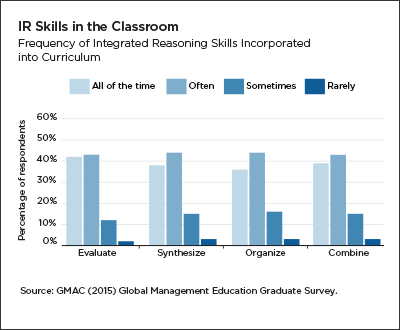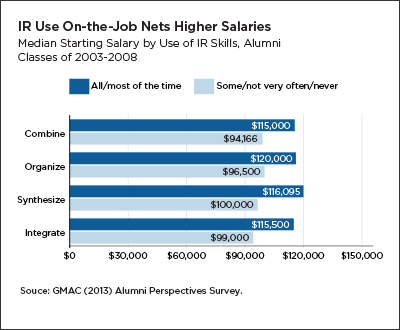Business school prepares students to evaluate, synthesize, organize, and combine data sources for employers that demand these skills.

In a 2009 GMAC
™ survey, more than 700 business school faculty indicated that integrated reasoning (IR) skills—including the evaluation, synthesis, organization, and combination of multiple data sources—are a prerequisite for 21st century management students as they prepare to work in technologically advanced, data-driven environments. In response to the market demand for measuring these critical skills, GMAC introduced the Integrated Reasoning (IR) section to the GMAT™ exam in June 2012. The IR section was designed to measure prospective students’ ability to synthesize information from multiple sources, then manipulate and organize that information to solve complex problems.
Since the launch of IR, GMAC Research has conducted multiple studies on the prevalence of IR skills in business school curricula, the level of employer demand for job candidates with demonstrated integrated reasoning skills, and alumni career outcomes for those who use IR skills regularly on the job.
Results from GMAC’s
2015 Global Management Education Graduate Survey revealed that IR skills are widely incorporated into graduate business programs. Across the entire spectrum of IR skills, more than 80 percent of graduating students who responded to the survey indicated high levels of incorporation (often or all of the time) in their graduate business study.

Employer demand for job candidates with demonstrated analytical and IR skills continues to grow across industry sectors, partly fueled by the demand for candidates to fill data analytics positions. As the world’s businesses have become increasingly dependent on insights from the vast amounts of data available today, IR skills have become a critical component to the success of business school candidates around the world. In GMAC’s 2014 Year-End Poll of Employers, 61 percent of respondents strongly agreed that today’s business school graduates need to be able to use data in order to drive decisions.
In studying the career outcomes of business school alumni, our research shows that the more alumni use IR skills on the job, the higher their median salary is, according to the 2013 Alumni Perspectives Survey. Among business school alumni from the classes of 2003-2008, there was an average difference of US $19,232 between median salaries of those who use IR skills all or most of the time and those who used the skills some of the time to never.

For more on the learning and career outcomes of graduate business school alumni, read the 2016 Alumni Perspectives Survey Report. For more on employer demand for business school graduates, read the 2016 Corporate Recruiters Survey Report.